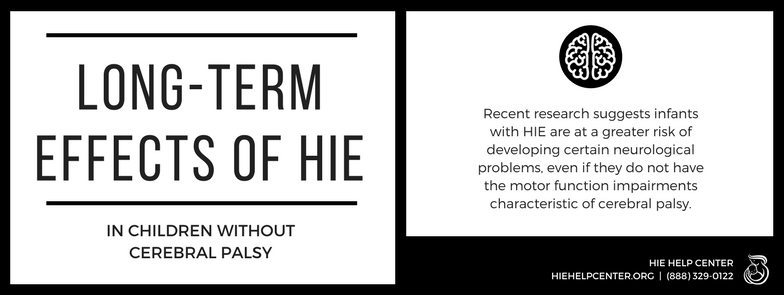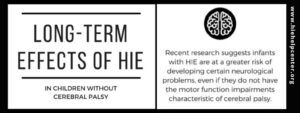Research in the European Journal of Pediatrics suggests that infants who survive hypoxic-ischemic encephalopathy (HIE) are at a greater risk of developing certain long-term neurological problems, even if they do not have the motor function impairments characteristic of cerebral palsy (CP).
Long-term Effects of CP & HIE
For many years, it has been widely believed that cerebral palsy is the primary neurological outcome of hypoxic-ischemic encephalopathy, and that HIE survivors who do not develop CP are free of any long-term effects. However, the patterns of hypoxic-ischemic brain injury include areas important for functions other than motor control. For example, the hippocampus and striatum, which are involved in memory and attention.
Hypothesis
Breda Hayes and colleagues hypothesized that survivors of mild HIE may have subtle cognitive deficits, which might not be measurable until they reach school age.
Research
Researchers assessed 146 children who sustained HIE at or around the time of birth, but did not develop cerebral palsy. Most had been diagnosed with Sarnat stage I or II encephalopathy, which placed them on the mild-moderate end of the brain damage spectrum (only one child had stage III). They found that children who were 42 months or younger scored normally on most assessments, with the exception of an adaptive behavior questionnaire, on which they performed slightly more poorly than would be expected of peers without any brain damage. Older children (over 42 months) had more pronounced impairments. Compared to the general population, these children were more likely to have problems with memory, attention, and appropriate behavior. Impairments were observed even among children who had only been diagnosed with Sarnat stage I encephalopathy.
Study Limitations
One important limitation of this study is that the data were collected before the introduction of hypothermia therapy, which can prevent or minimize negative outcomes of hypoxic-ischemic encephalopathy. However, Hayes et al. note that most children with mild hypoxic-ischemic encephalopathy are not given hypothermia therapy. Given the results of this study, perhaps the protocols determining when this treatment is administered should be revisited.
Conclusion
The authors conclude by emphasizing that certain effects of hypoxic-ischemic encephalopathy may not be recognizable in infants or toddlers. Therefore, infants who were diagnosed with HIE in infancy should be monitored further into childhood. They suggest that the adaptive behavior questionnaire can be a helpful tool for determining which children will require developmental surveillance past the age of two.
About the HIE Help Center and ABC Law Centers
The HIE Help Center is run by ABC Law Centers, a medical malpractice firm exclusively handling cases involving HIE and other birth injuries. Our lawyers have been advocating for children with HIE since the firm’s inception in 1997.
If you suspect your child’s birth injury was by medical negligence, contact us to learn about pursuing a case. We provide free legal consultations, during which we will inform you of your legal options and answer any questions you have. Moreover, you would pay nothing throughout the entire legal process unless we obtain a favorable settlement.
Source:
Hayes, B. C., Doherty, E., Grehan, A., Madigan, C., McGarvey, C., Mulvany, S., … & King, M. D. (2018). Neurodevelopmental outcome in survivors of hypoxic ischemic encephalopathy without cerebral palsy. European journal of pediatrics, 177(1), 19-32.



Leave a Reply
You must be logged in to post a comment.